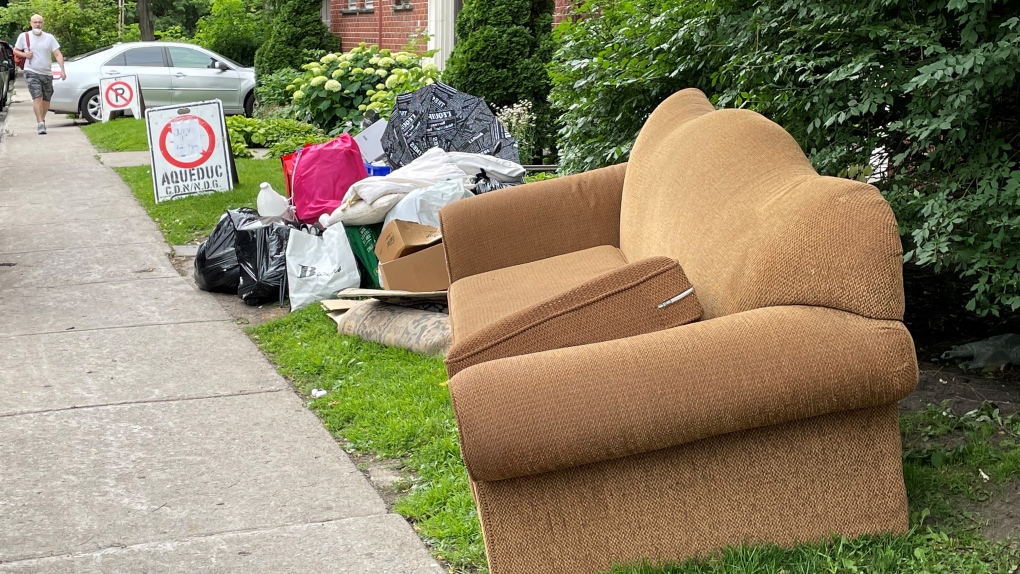Bed bug basics: How to prevent them, how to find them, and what to do if you have them
Summer is moving season in Montreal. It's also the season when the most unwanted of roommates -- bed bugs -- are at their peak.
Don Prashker is the owner of Thermapro Solutions, a Montreal company that specializes in bed bug extermination.
He shared a few tips to keep in mind this summer, whether you're trying to avoid bed bugs or already have them in your space.
LEAVE CURBED FURNITURE ON THE CURB
According to Prashker, the easiest way to deal with bed bugs is to prevent them from entering your home in the first place.
The insects are particularly common in apartment buildings as they can easily migrate from one unit to the next -- but they can also hitchhike from faraway places.
One common mode of transportation is used furniture, which can be a major gamble when it comes to bugs, especially when that furniture is picked up on the side of the road.
 Moving day in Montreal means piles of furniture and other discarded items along the streets. (Touria Izri/CTV News)
Moving day in Montreal means piles of furniture and other discarded items along the streets. (Touria Izri/CTV News)
"There's a lot of furniture being left out on curbsides and on corners," he said. "People are literally collecting that, bringing that into their own home, and this is a great way to get bedbugs."
THE TRUTH IS IN THE POOP
But what about the furniture you already own -- how can you tell if there's an issue?
"Bed bugs always leave their calling cards, and that's their poop," says Prashker.
"They're black little dots, like someone took a toothbrush, dipped it in ink, and kind of spritzed it on the mattress."
 (File image)
(File image)
These speckles will often appear on the seams of the mattress or even on bedsheets.
When you move into a new place, search for these telltale stains around baseboards and electrical outlets, as their presence could indicate an infestation that's been around for a while.
Bugs sometimes relocate to these areas after the furniture has been sprayed with over-the-counter treatments, Prashker explains.
DITCH THE DIY METHODS
Speaking of which, Prashker says do-it-yourself treatments should be avoided if possible.
He says the trick to getting rid of bed bugs is by baiting them, not repelling them, which is why he recommends professional heat treatments over common chemicals.
"Please be careful when using over-the-counter products," he said. "They tend to be repellents, and you don't want to repel bed bugs. That's just pushing the problem from one unit to the next."
Instead, he recommends hiring professionals who can pump heat into the rooms and "literally cook" its contents, killing the bugs.
"Bed bugs are instinctively attracted to heat, so they come towards the heat treatment," he explains. "We just continue to crank up the heat everywhere until it's universal, and there's nowhere for the bed bugs to go."
When moving to a new place, he says tenants should keep an eye out for signs of treatments past.
"If you see any pesticides or residuals or traps, these are good signs to ask the landlord what was going on."
ACT FAST
Take action soon as you spot the signs, Prashker advises.
"The earlier you get on top of a bed bug problem, the easier it is to solve," he says. "It's a lot easier to kill five of them than it is to kill 5,000 of them."
If you don't address it right away?
"Within three months, you'll have an infestation. Within six months you'll have more eggs than you do bugs."
BUST THE STIGMA
The biggest way to prevent the spread of bed bugs is by addressing the shame that comes with them, according to Prashker.
"There's a huge psychological stigma to this problem," even though bed bugs don't necessarily indicate a lack of hygiene or a dirty home.
He says reluctance to openly discuss the issue hinders the implementation of protocols that could slow the spread.
When a child has lice, for example, school administration sends out a letter to parents informing them -- but these same measures don't exist for bed bugs.
"So kids are coming to school when they have bed bugs at home, and three more kids are now bringing them home as well."
--With files from CTV's Touria Izri
CTVNews.ca Top Stories

W5 Investigates A 'ticking time bomb': Inside Syria's toughest prison holding accused high-ranking ISIS members
In the last of a three-part investigation, W5's Avery Haines was given rare access to a Syrian prison, where thousands of accused high-ranking ISIS members are being held.
'Mayday!': New details emerge after Boeing plane makes emergency landing at Mirabel airport
New details suggest that there were communication issues between the pilots of a charter flight and the control tower at Montreal's Mirabel airport when a Boeing 737 made an emergency landing on Wednesday.
Federal government posts $13B deficit in first half of the fiscal year
The Finance Department says the federal deficit was $13 billion between April and September.
BREAKING Supreme Court affirms constitutionality of B.C. law on opioid health costs recovery
Canada's top court has affirmed the constitutionality of a law that would allow British Columbia to pursue a class-action lawsuit against opioid providers on behalf of other provinces, the territories and the federal government.
Cucumbers sold in Ontario, other provinces recalled over possible salmonella contamination
A U.S. company is recalling cucumbers sold in Ontario and other Canadian provinces due to possible salmonella contamination.
Nick Cannon says he's seeking help for narcissistic personality disorder
Nick Cannon has spoken out about his recent diagnosis of narcissistic personality disorder, saying 'I need help.'
Real GDP per capita declines for 6th consecutive quarter, household savings rise
Statistics Canada says the economy grew at an annualized pace of one per cent during the third quarter, in line with economists' expectations.
Irregular sleep patterns may raise risk of heart attack and stroke, study suggests
Sleeping and waking up at different times is associated with an increased risk of heart attack and stroke, even for people who get the recommended amount of sleep, according to new research.
Canadian news publishers suing ChatGPT developer OpenAI
A coalition of Canadian news publishers is suing OpenAI for using news content to train its ChatGPT generative artificial intelligence system.


































